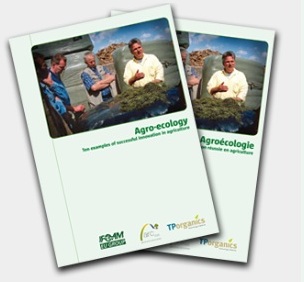On November 15th, approximately 80 people gathered in Brussels for the final event of the Agro-ecological Innovation project: a collaboration of ARC2020, IFOAM EU Group and TP Organics. The event provided an opportunity for the partners to showcase the project to a diverse audience, and present recommendations derived from the project regarding how best to integrate agro-ecological innovation in the new policy frameworks for agriculture and research & innovation.
 Launched back in April, the main outputs of the project are a website (agro-ecoinnovation.eu) and a promotional brochure. The brochure presents 10 examples in which European farmers, consumers and researchers are collaborating for the sake of innovation. Some are devising agricultural systems that make full use of ecological services; some are finding new forms of knowledge exchange; and some are inspiring citizens to a better food culture. The brochure is available in French and English.
Launched back in April, the main outputs of the project are a website (agro-ecoinnovation.eu) and a promotional brochure. The brochure presents 10 examples in which European farmers, consumers and researchers are collaborating for the sake of innovation. Some are devising agricultural systems that make full use of ecological services; some are finding new forms of knowledge exchange; and some are inspiring citizens to a better food culture. The brochure is available in French and English.
The event
After a short welcome note by Marco Schlüter (IFOAM EU), Bram Moeskops (TP Organics) presented the concept of agro-ecology (find his whole presentation here). Also speaking at the event was Antonio Di Gulio, Acting Director of the Biotechnologies, Agriculture and Food Directorate, DG Research and Innovation. He presented his opinion on innovation in the agricultural sector and how this should be addressed within Horizon 2020. The main points he raised were:
- The value of a continuous dialogue and real knowledge transfer
- The need for proposed solutions to take the necessary complexity of the system into account
- The role of European Institutions in providing a stable regulatory environment to encourage actors to invest money and time in innovation
- The importance of a fertile economic situation in order to let innovation flourish
The second part of the morning was devoted to three successful examples of agro-ecological innovation:
- Synergies between nature conservation and agriculture (Netherlands) here
- Organic Farm Bec Hellouin (France) here
- Food for Life Partnership (UK) here
Panel Debate
The final part of the event was dedicated to the policy recommendations, presented by Samuel Féret (ARC2020). This was followed by a panel debate with Michel Dupont (Assistant, José Bové MEP), Antonio Di Gulio, Inge Van Oost (DG Agriculture and Rural Development), Marco Schlüter (IFOAM EU), Andrea Ferrante (AIAB) and Samuel Féret. Starting from the need for a paradigm shift and a transition towards sustainable agriculture, Féret asked for a real greening of the CAP, including the progressive increase of environmental standards as a condition for direct payments, and in the Rural Development schemes. Horizon 2020 should dedicate 225-450 million € for organic and low-input farming (5-10% of proposed budget for agricultural research) and should be based on a broad and inclusive understanding of innovation. The EIP Agricultural Productivity and Sustainability should prioritize the exchange of agro-ecological knowledge.
Antonio Di Giulio agreed on the need for a paradigm shift and stated that many of the concerns regarding knowledge exchange and innovation uptake are being addressed by the Innovation Union and the Bioeconomy strategy. Andrea Ferrante stated that the protection of small-scale farmers must be a pre-condition for the conservation of local and agro-ecological knowledge. In this regard, he also criticized the current seed regulation which forbids farmers to exchange local varieties and the strict sanitary rules that are not suited for small-scale processors.
Inge Van Oost agreed that a multi-actor approach is necessary for innovation and assured this approach will be taken by the EIP. Furthermore, she stated the EIP will have relevance beyond the innovation projects that result from the EIP. Also, for the more classic research projects an integral strategy for dissemination of results will be required.

